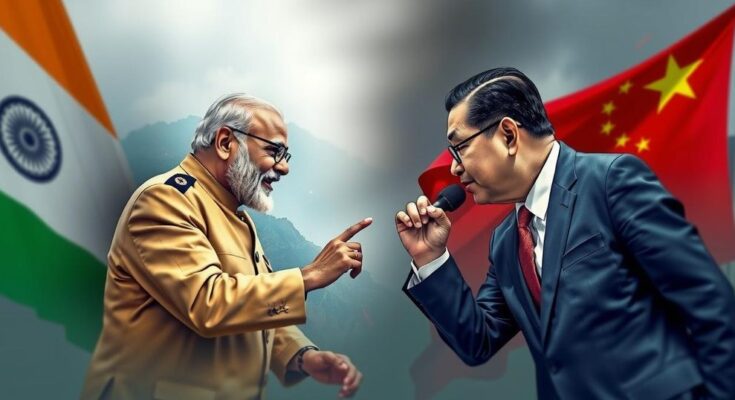India and China have announced an agreement to de-escalate border tensions through new patrolling arrangements along their disputed Himalayan border. This agreement follows the 2020 Galwan Valley clashes, which marked a severe downturn in relations. The specifics of the disengagement process remain undisclosed, and the situation continues to warrant careful diplomatic attention.
India and China have reached an agreement to implement new patrolling arrangements aimed at de-escalating tensions along their long-disputed Himalayan border, as announced by India’s top diplomat, Vikram Misri. On Monday, Mr. Misri reported that both nations have committed to “disengagement and resolution of issues in these [border] areas that had arisen in 2020,” referencing the severe clashes that occurred in the Galwan Valley, which resulted in casualties for both parties and marked the first deadly encounter between the two since 1975. The agreement pertains specifically to the Line of Actual Control (LAC), with the aim of reducing hostilities and addressing the concerns that emerged during the confrontations of 2020. However, Mr. Misri did not provide detailed information regarding the mechanics of the disengagement process, nor did he specify whether it would encompass all contentious points along the border. This statement was delivered on the eve of Indian Prime Minister Narendra Modi’s visit to Russia for a meeting of BRICS nations—which include Brazil, Russia, India, China, and South Africa—although it remains unclear if a bilateral meeting between Prime Minister Modi and Chinese President Xi Jinping will be discussed during this summit. Mr. Misri’s comments represent a significant development in the ongoing struggle between the two nuclear powers, particularly since previous talks have failed to yield substantial results despite numerous discussions among diplomats and military leaders over the past four years. Persistent border skirmishes have continued, with notable incidents reported in the northern Sikkim area in 2021 and again in the Tawang sector in 2022. The underlying tensions date back decades and were exacerbated by a brief war in 1962, where India faced a decisive defeat at the hands of China. The volatility surrounding border disputes has severely impacted not only diplomatic relations but also economic ties between the two nations. Given that the disputed border stretches 3,440 kilometers (approximately 2,100 miles), defined by rivers, lakes, and snowcapped areas, it often becomes a flashpoint for military encounters due to shifting geographical markers. Additionally, the ongoing competition to establish infrastructure in these border regions has contributed to escalating tensions.
The relationship between India and China has been fraught with tension and conflict for decades, particularly concerning a poorly defined border stretching over 3,440 kilometers. The 1962 Sino-Indian War remains a significant historical reference point, resulting in a heavy defeat for India and deeply impacting bilateral relations. Critical incidents, such as the Galwan Valley clash in 2020, which marked the first fatalities since 1975, have further complicated the relationship, highlighting the ongoing disputes that lead to military confrontations. Numerous rounds of talks have been attempted but have often failed to achieve lasting resolutions, leading to heightened military posturing and conflict.
The agreement between India and China to establish new patrolling arrangements along the disputed border represents a potentially positive step towards reducing tensions that have escalated since the 2020 Galwan Valley clashes. Although specific details regarding the disengagement process remain unclear, both nations appear to be expressing a commitment to resolving outstanding issues. The ongoing disputes and confrontations over the ill-defined border underscore the need for continued dialogue to prevent future conflicts and maintain regional stability. The outcome of Prime Minister Modi’s upcoming discussions at the BRICS summit may further influence the trajectory of India-China relations moving forward.
Original Source: www.bbc.com




